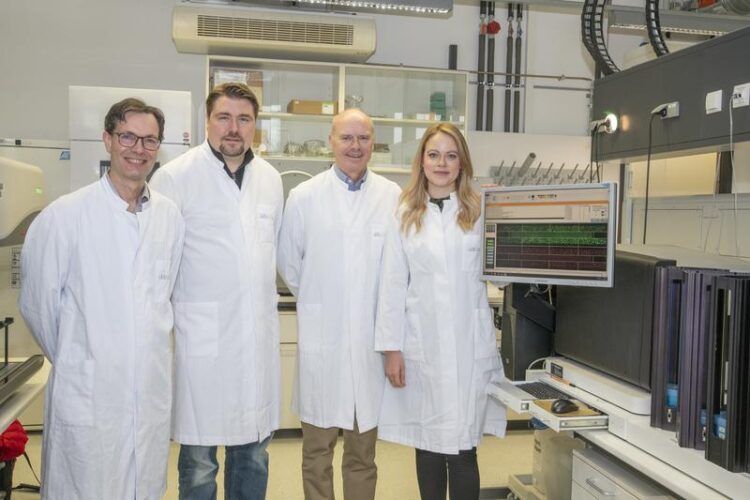News on drug-induced skin swelling

(from left) Prof. Bernhardt Sachs from the BfArM and Prof. Andreas Forstner, Prof. Markus Nöthen and Carina Mathey from the Institute of Human Genetics of the UKB and the University of Bonn.
(c) Rolf Müller / Universitätsklinikum Bonn
Researchers identify novel risk locus in the genome for ACE inhibitor-induced.
Angioedema is a rare but potentially life-threatening adverse reaction to ACE inhibitors. In a joint analysis of eight European study collectives, researchers from the University Hospital Bonn (UKB), the University of Bonn and the Federal Institute for Drugs and Medical Devices (BfArM) for the first time conducted a genome-wide association study (GWAS) with more than 1,000 affected individuals. They identified a total of three risk loci in the genome. These included a new locus that had not previously been associated with the risk of ACE inhibitor-induced angioedema. The results of the study have now been published in the “Journal of Allergy and Clinical Immunology”.
Angiotensin-converting enzyme inhibitors – ACE inhibitors for short – are effective antihypertensive drugs. They block the formation of the hormone angiotensin II, which plays a central role in the development of high blood pressure. On the other hand, these drugs increase the concentration of the vasoactive signaling substance bradykinin. Among other things, this can lead to acute swelling of the skin or mucous membranes. In general, such swellings are not life-threatening. However, if they affect the tongue, throat or larynx, angioedema can be life-threatening for the patient due to the potential risk of suffocation. Research to date suggests that susceptibility to such drug-induced angioedema is influenced by hereditary as well as lifestyle and environmental factors. “However, the understanding of the underlying biological processes, i.e. the pathophysiology, and thus the individual risk assessment is still limited. The identification of the responsible genes will provide completely new insights here,” says Prof. Markus Nöthen, Director of the Institute of Human Genetics at the UKB and member of the Transdisciplinary Research Area (TRA) “Life & Health” at the University of Bonn, describing the motivation to take a closer look at the occurrence of ACE inhibitor-induced angioedema.
Which biological processes play a role in ACE inhibitor-induced angioedema?
Based on data from eight European study collectives, the team from Bonn, together with cooperation partners, conducted the first GWAS with more than 1,000 patients with ACE inhibitor-induced angioedema. They identified a total of three loci in the genome that are associated with the risk of ACE inhibitor-induced angioedema. “While two of the loci have already been described in previous studies, our study was the first to demonstrate a significant association for a new locus on chromosome 20,” explains corresponding author Prof. Andreas Forstner from the Institute of Human Genetics at the UKB and the University of Bonn and at the Institute of Neuroscience and Medicine (INM-1) at the Research Center Jülich. “Through further bioinformatic analyses, we were able to identify several candidate genes at the three risk loci indicating that genetic changes in the bradykinin, coagulation and fibrinolysis signaling play a role in the development of this type of angioedema,” adds first author Carina Mathey, doctoral student at the Institute of Human Genetics at the UKB and the University of Bonn.
The current study provides a starting point for further studies with new insights into the genetic basis and potential biological mechanisms underlying ACE inhibitor-induced angioedema. “The identification of further risk loci through a continuous expansion of the GWAS study collectives in combination with functional analyses and the evaluation of lifestyle and environmental factors will make an important contribution to the development of new approaches for prevention, diagnostics and therapy in the long term,” says Prof. Bernhardt Sachs from the BfArM.
Press contact:
Dr. Inka Väth
Deputy spokeswoman at the University Hospital Bonn (UKB)
Communications and Media Office at Bonn University Hospital
Phone: (+49) 228 287-10596
E-mail: inka.vaeth@ukbonn.de
Wissenschaftliche Ansprechpartner:
Carina Mathey
Institute of Human Genetics
Bonn University Hospital & University of Bonn
Phone: +49-(0)228 6885 – 424
E-Mail: cmathey@uni-bonn.de
Originalpublikation:
Carina M. Mathey et al; Meta-analysis of ACE inhibitor-induced angioedema identifies novel risk locus; Journal of Allergy and Clinical Immunology;
DOI: https://doi.org/10.1016/j.jaci.2023.11.921
Link to publication:
https://www.jacionline.org/article/S0091-6749(23)02457-0/fulltext
Media Contact
All latest news from the category: Health and Medicine
This subject area encompasses research and studies in the field of human medicine.
Among the wide-ranging list of topics covered here are anesthesiology, anatomy, surgery, human genetics, hygiene and environmental medicine, internal medicine, neurology, pharmacology, physiology, urology and dental medicine.
Newest articles

NASA: Mystery of life’s handedness deepens
The mystery of why life uses molecules with specific orientations has deepened with a NASA-funded discovery that RNA — a key molecule thought to have potentially held the instructions for…

What are the effects of historic lithium mining on water quality?
Study reveals low levels of common contaminants but high levels of other elements in waters associated with an abandoned lithium mine. Lithium ore and mining waste from a historic lithium…

Quantum-inspired design boosts efficiency of heat-to-electricity conversion
Rice engineers take unconventional route to improving thermophotovoltaic systems. Researchers at Rice University have found a new way to improve a key element of thermophotovoltaic (TPV) systems, which convert heat…



